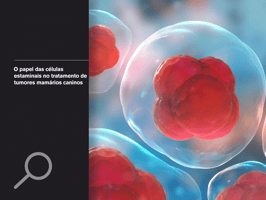Mammary gland tumors in dogs are dependent on estrogen and progesterone, being most frequently seen in female dogs. They are composed of proliferative luminal epithelial cells, myoepithelial cells and mesenchymal cells with cartilage and osseous tissues in a solitary mass. Although stilling an incognita, it seems that cancer stem cells (CSCs) play an important role in this complex histological pattern.
This paper reviews the research on CSCs in canine mammary tumors and aims to characterize them, to create hypothesis about the hierarchal structure in the different types of mammary tumors and to evaluate the current and prospective studies of CSC metabolism.
In veterinary medicine, cancer stem cells were firstly identified in osteosarcoma (Wilson et al., 2008) and they can be assessed using various “gold standard methods”. In canine mammary adenocarcinoma, CSCs can be identified by their expression of the surface markers CD44 and CD24, side population flow cytometric analysis, sphere-forming assay, and aldehyde dehydrogenase activity.
The novel hypothesis of tumor development in simple and complex types of the canine mammary gland here presented states that in simple type, CSCs differentiate into either neoplastic luminal or myoepithelial cells but in complex types tumors, CSCs can differentiate into both. More theories are discussed and the need to further in vitro and in vivo research using CSCs is clear.
The metabolic properties of cancer stem cells were also assessed. In fact, despite the lack of knowledge about the significance of cellular metabolism of CSCs in canine mammary tumors, human medicine has already demonstrated the importance of amino acids and fatty acids metabolism in the maintenance of stemness of CSCs; as an example, proline metabolism is involved in the self-renewal capacity of human breast CSCs.
In veterinary medicine, some studies showed that mammospheres isolated from spontaneous canine mammary carcinomas are highly sensitive to metformin and that this drug may have an antitumor effect. Nevertheless, further studies and consequent discoveries about the metabolism of CSCs in canine mammary tumors are crucial for the development of novel therapeutics that rely on CSC metabolism targeting. This strategy seems to be of value for eradicating cancer progression, given that the reprograming of CSC metabolism is vital for tumourigenesis, metastasis, drug resistance, and recurrence.
M. Michishita. (2020). Understanding of tumourigenesis in canine mammary tumours based on cancer stem cell research. The Veterinary Journal, 265, 105560. http://dx.doi.org/10.1016/j.tvjl.2020.105560

